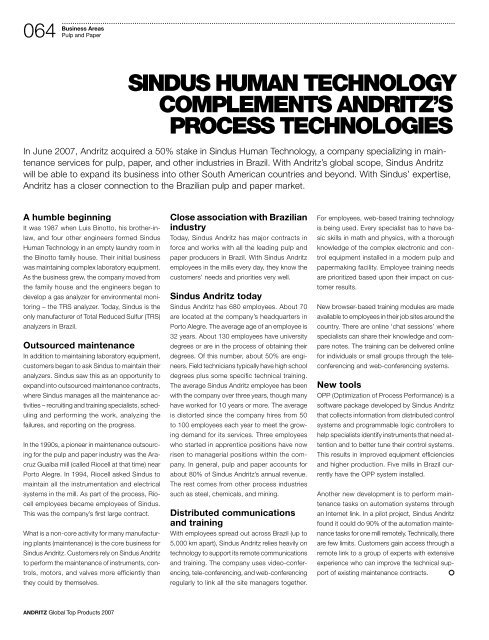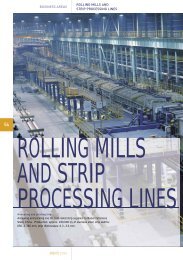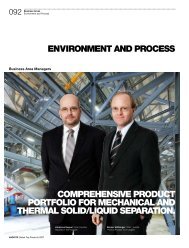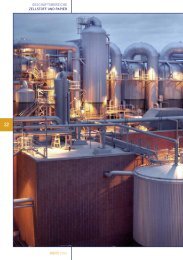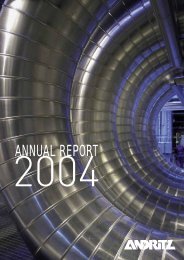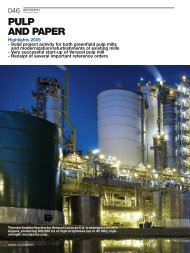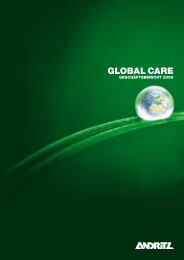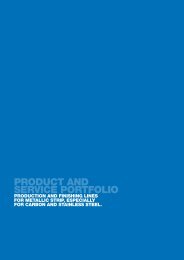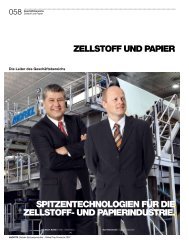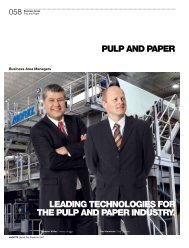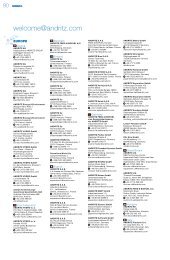Download as pdf - andritz business areas
Download as pdf - andritz business areas
Download as pdf - andritz business areas
- No tags were found...
Create successful ePaper yourself
Turn your PDF publications into a flip-book with our unique Google optimized e-Paper software.
064<br />
Business Are<strong>as</strong><br />
Pulp and Paper<br />
SINDUS HUMAN TECHNOLOGY<br />
comPLEMENTS ANDRITZ’S<br />
PROCESS TECHNOLOGIES<br />
In June 2007, Andritz acquired a 50% stake in Sindus Human Technology, a company specializing in maintenance<br />
services for pulp, paper, and other industries in Brazil. With Andritz’s global scope, Sindus Andritz<br />
will be able to expand its <strong>business</strong> into other South American countries and beyond. With Sindus’ expertise,<br />
Andritz h<strong>as</strong> a closer connection to the Brazilian pulp and paper market.<br />
A humble beginning<br />
It w<strong>as</strong> 1987 when Luis Binotto, his brother-inlaw,<br />
and four other engineers formed Sindus<br />
Human Technology in an empty laundry room in<br />
the Binotto family house. Their initial <strong>business</strong><br />
w<strong>as</strong> maintaining complex laboratory equipment.<br />
As the <strong>business</strong> grew, the company moved from<br />
the family house and the engineers began to<br />
develop a g<strong>as</strong> analyzer for environmental monitoring<br />
– the TRS analyzer. Today, Sindus is the<br />
only manufacturer of Total Reduced Sulfur (TRS)<br />
analyzers in Brazil.<br />
Outsourced maintenance<br />
In addition to maintaining laboratory equipment,<br />
customers began to <strong>as</strong>k Sindus to maintain their<br />
analyzers. Sindus saw this <strong>as</strong> an opportunity to<br />
expand into outsourced maintenance contracts,<br />
where Sindus manages all the maintenance activities<br />
– recruiting and training specialists, scheduling<br />
and performing the work, analyzing the<br />
failures, and reporting on the progress.<br />
In the 1990s, a pioneer in maintenance outsourcing<br />
for the pulp and paper industry w<strong>as</strong> the Aracruz<br />
Guaíba mill (called Riocell at that time) near<br />
Porto Alegre. In 1994, Riocell <strong>as</strong>ked Sindus to<br />
maintain all the instrumentation and electrical<br />
systems in the mill. As part of the process, Riocell<br />
employees became employees of Sindus.<br />
This w<strong>as</strong> the company’s first large contract.<br />
What is a non-core activity for many manufacturing<br />
plants (maintenance) is the core <strong>business</strong> for<br />
Sindus Andritz. Customers rely on Sindus Andritz<br />
to perform the maintenance of instruments, controls,<br />
motors, and valves more efficiently than<br />
they could by themselves.<br />
Close <strong>as</strong>sociation with Brazilian<br />
industry<br />
Today, Sindus Andritz h<strong>as</strong> major contracts in<br />
force and works with all the leading pulp and<br />
paper producers in Brazil. With Sindus Andritz<br />
employees in the mills every day, they know the<br />
customers’ needs and priorities very well.<br />
Sindus Andritz today<br />
Sindus Andritz h<strong>as</strong> 680 employees. About 70<br />
are located at the company’s headquarters in<br />
Porto Alegre. The average age of an employee is<br />
32 years. About 130 employees have university<br />
degrees or are in the process of obtaining their<br />
degrees. Of this number, about 50% are engineers.<br />
Field technicians typically have high school<br />
degrees plus some specific technical training.<br />
The average Sindus Andritz employee h<strong>as</strong> been<br />
with the company over three years, though many<br />
have worked for 10 years or more. The average<br />
is distorted since the company hires from 50<br />
to 100 employees each year to meet the growing<br />
demand for its services. Three employees<br />
who started in apprentice positions have now<br />
risen to managerial positions within the company.<br />
In general, pulp and paper accounts for<br />
about 80% of Sindus Andritz’s annual revenue.<br />
The rest comes from other process industries<br />
such <strong>as</strong> steel, chemicals, and mining.<br />
Distributed communications<br />
and training<br />
With employees spread out across Brazil (up to<br />
5,000 km apart), Sindus Andritz relies heavily on<br />
technology to support its remote communications<br />
and training. The company uses video-conferencing,<br />
tele-conferencing, and web-conferencing<br />
regularly to link all the site managers together.<br />
For employees, web-b<strong>as</strong>ed training technology<br />
is being used. Every specialist h<strong>as</strong> to have b<strong>as</strong>ic<br />
skills in math and physics, with a thorough<br />
knowledge of the complex electronic and control<br />
equipment installed in a modern pulp and<br />
papermaking facility. Employee training needs<br />
are prioritized b<strong>as</strong>ed upon their impact on customer<br />
results.<br />
New browser-b<strong>as</strong>ed training modules are made<br />
available to employees in their job sites around the<br />
country. There are online ‘chat sessions’ where<br />
specialists can share their knowledge and compare<br />
notes. The training can be delivered online<br />
for individuals or small groups through the teleconferencing<br />
and web-conferencing systems.<br />
New tools<br />
OPP (Optimization of Process Performance) is a<br />
software package developed by Sindus Andritz<br />
that collects information from distributed control<br />
systems and programmable logic controllers to<br />
help specialists identify instruments that need attention<br />
and to better tune their control systems.<br />
This results in improved equipment efficiencies<br />
and higher production. Five mills in Brazil currently<br />
have the OPP system installed.<br />
Another new development is to perform maintenance<br />
t<strong>as</strong>ks on automation systems through<br />
an Internet link. In a pilot project, Sindus Andritz<br />
found it could do 90% of the automation maintenance<br />
t<strong>as</strong>ks for one mill remotely. Technically, there<br />
are few limits. Customers gain access through a<br />
remote link to a group of experts with extensive<br />
experience who can improve the technical support<br />
of existing maintenance contracts.<br />
ANDRITZ Global Top Products 2007


